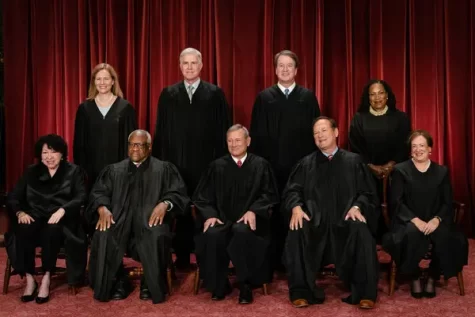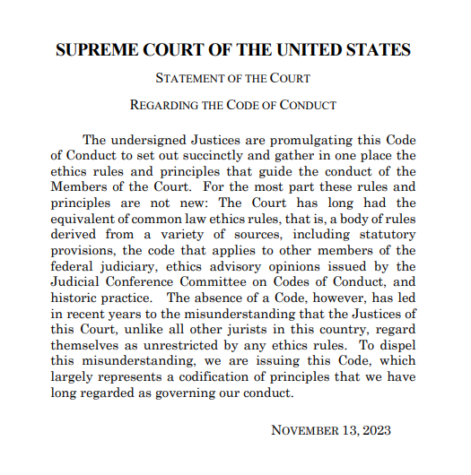
Sophie Rapeepat | Head Editor
November 30, 2023
In 1215 England, the Magna Carta declared that no man is above the law, not even the king. This notion of equality is the core foundation of our own country, and our government was formed to protect the rights of each citizen. However, recent scrutiny has targeted members of the Supreme Court for accepting undisclosed monetary gifts and trips as variations of bribery. In response, the Justices issued a Code of Conduct on November 13, publicly subjecting themselves to a standard of ethical values.
According to junior Taj Peniata, “the code seems great because it promotes judicial integrity and fairness in the system.”
Although accountability is always a step in the right direction, the code is misleading upon closer inspection. For one, it was only issued to “dispel the misunderstanding” that justices of the Court “regard themselves as unrestricted by any ethics rules.” This motive gives the superficial impression that the Justices simply seek to appease the public with a show of accountability, rather than actually addressing the issue of corruption among themselves. Only after they were called out and shamed for their abuse of power did they take a step towards reform.

Additionally, no method has been implemented to enforce the code. This means that justices face no consequences by an external arbiter for breaking it and the entire document is open to interpretation. Furthermore, several of the rules themselves are borderline useless due to the amount of loopholes. For example, Canon 3B declares that the judicial function of recusal is parallel with the law applying to lower court judges. A conflict of interest would result in a judicial disqualification in which the Justice is deemed unfit and removed from the case. However, unlike other courts, justices of the Supreme Court have the ability to disregard a recusal simply if they believe their vote is necessary in the case, ultimately stripping the rule of its power.
Superficial motives and loopholes fail to hold the Court to an ethical standard. Checks and balances effectively distribute power, and it’s time this principle applies to the Justices of the Supreme Court. The Code of Conduct is a start, but real progress can only be achieved through legitimate reform of the system itself. Hopefully, increasing public pressure will lead to real changes, such as strict accountability and financial transparency.
“People are seeing through the Court’s proclamation,” said senior Dexter Brice. “No one is above the law, and it’s our responsibility to call out those who think they are.”
Click here to read for yourself!

Leave a Reply